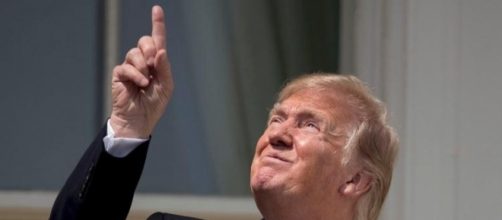Donald Trump was one of the major talking points on social media as millions across the United States watched a Total Solar Eclipse. The President was mocked online for appearing to look directly into the sun, despite warnings it could damage your eyes.
According to doctors, looking directly at a solar eclipse can burn a hole through a person's retinas. The extent of the damage largely depends on how long a person glimpses the eclipse. “It can range from blurry vision to absolute permanent vision loss,” Dr. Christopher Quinn, president of the American Optometric Association, told the New York Times.
Given it could be a once-in-a-lifetime opportunity, basically the whole world was advised to wear protective glasses to safely watch the total solar eclipse. Photos of people watching the eclipse with protective lenses smothered the internet and a few among them, as expected, are selfies.
Why you shouldn’t take a selfie during a solar eclipse
Columbia University Medical Center retinal expert Dr. Tongalp Tezel says taking a selfie during the solar eclipse can be just as damaging as looking directly at the sun. That’s because the screen of your phone reflects the ultraviolet rays directly towards your eye like a mirror, which can cause a solar burn.
The power of the sun shouldn’t be underestimated, as NASA has warned people repeatedly in the weeks leading up to the eclipse.
The rays that peek out when the sun is 99 percent covered are still enough to fry your retinas' delicate tissue and inflict lifelong damage.
According to Dr. Tezel, Sir Isaac Newton suffered retinal damage after looking at the reflection of an eclipse in the surface of a pond — the archaic equivalent of the cell phone screen. Viewing the eclipse through a telescope can also damage the retina, as Galileo himself learned because the device magnifies the sun’s harmful ultraviolet rays.
Signs of retinal damage
If you made the tragic mistake of taking a selfie and looking at your phone’s lenses during the “Great American Eclipse,” there’s a chance you might have damaged your eyes. So how will you know if you’ve been a victim?
Experts say it could take days before symptoms show up, but early signs could include “dim” sight and afterimages.
Long-term issues can include solar retinopathy, which is when the sun burns a hole in the retinal tissues, usually occurring at the fovea. This can cause loss of central vision, with symptoms occurring immediately to two weeks after exposure. Before that happens, visit your local eye doctor for a comprehensive exam.
Will Trump go blind?
We’re not quite sure at this point. According to the White House pool report, President Trump initially gesticulated to a crowd of administration staffers gathered below the balcony and pointed to the sky. As he did so, one of the White House aides standing beneath balcony shouted, “don't look!”
Well, he did, and mightily challenged the sun. One thing’s for sure, though – if you’re lucky enough to again witness the next total solar eclipse on 2024, take the “don’t look!” advice seriously and save your eyes.


